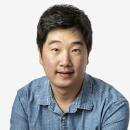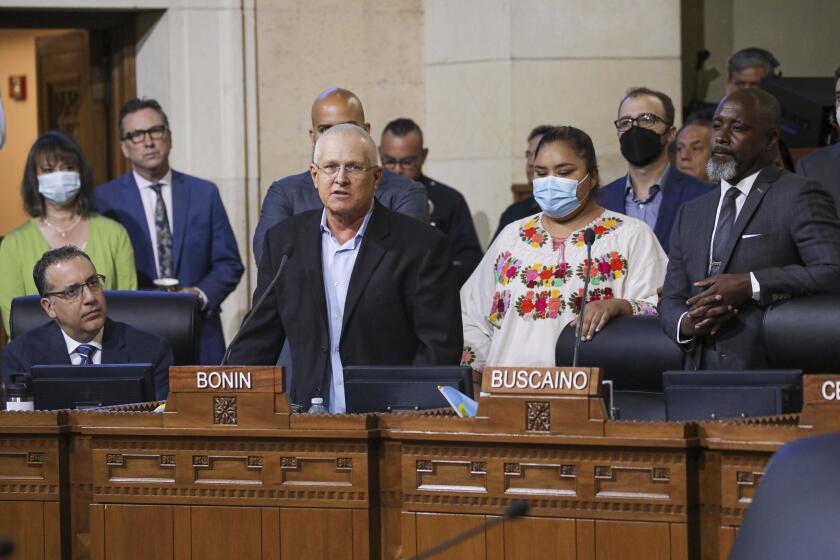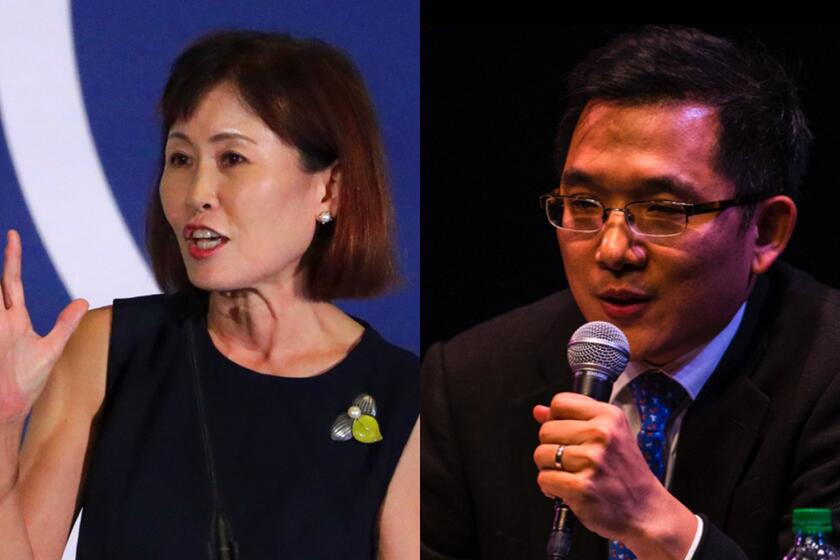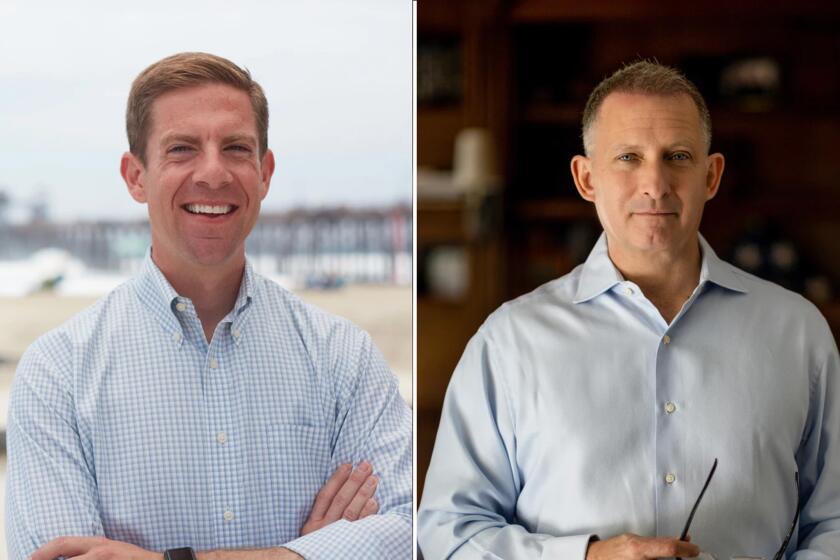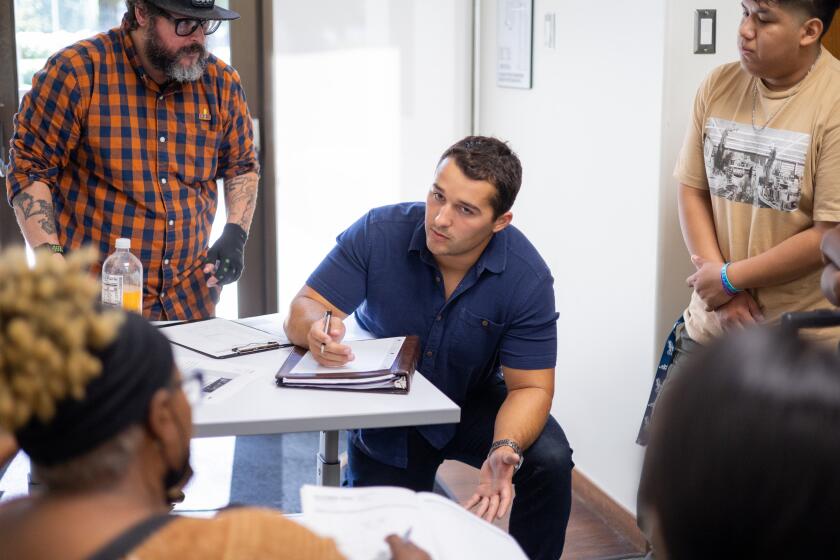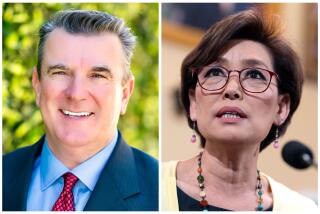A battle over who is the true progressive defines L.A. congressional race
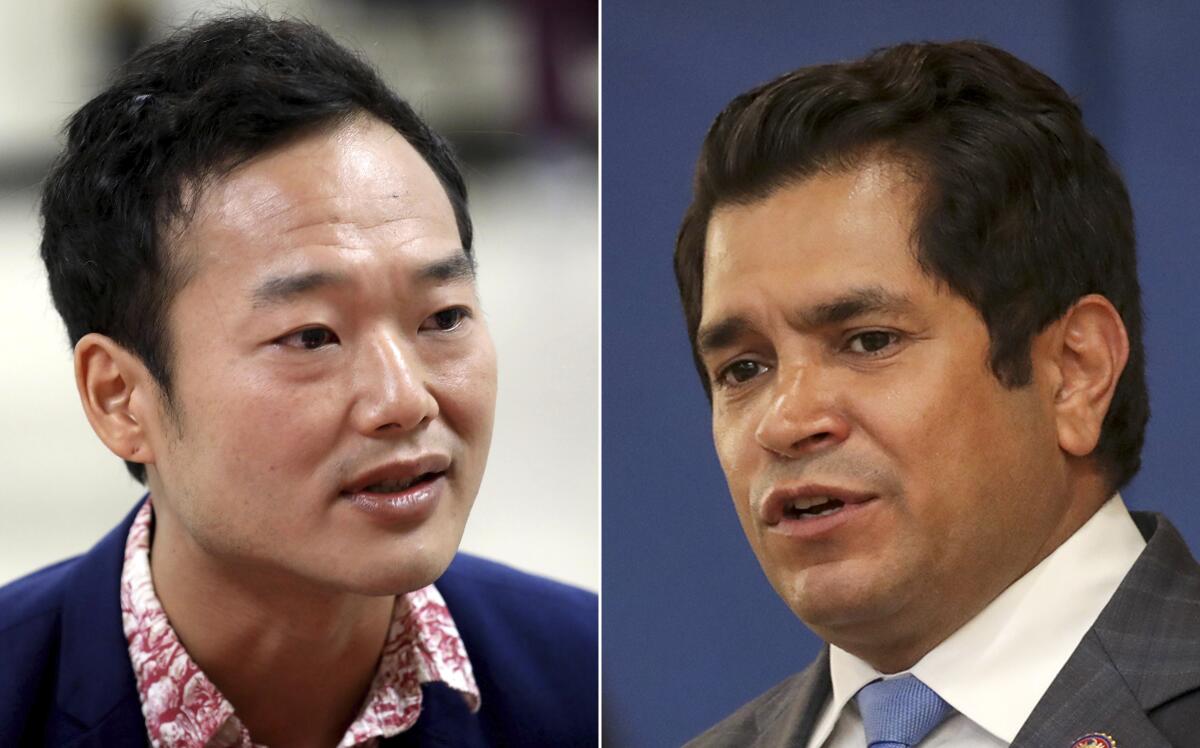
As the recording of a racist conversation between Los Angeles labor and political leaders plunged the city into a political crisis unlike any other, David Kim and Jimmy Gomez took different paths.
Gomez, an incumbent congressman, sat next to mayoral candidate Rep. Karen Bass and former Mayor Antonio Villaraigosa in a room at Los Angeles Trade-Technical College, calling for unity.
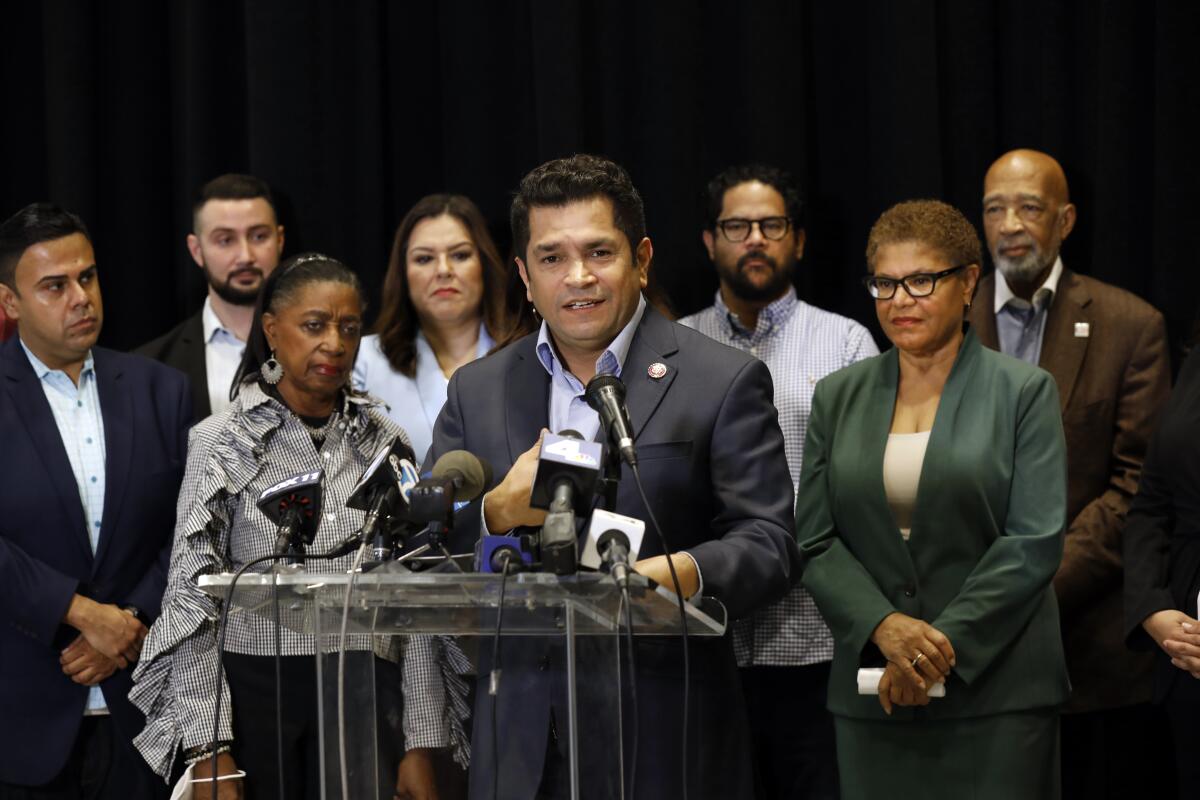
Kim, an immigration and child dependency attorney running against Gomez, stood in a crowd of protesters in front of City Hall. With profanity, he decried how special interests are corrupting the city and called for continued demonstrations.
“We need a moral revolution in Los Angeles,” Kim yelled, holding a microphone. In the leaked conversation, the Latino leaders mocked people in racist terms and plotted to undermine Black political power.
Whether Gomez or Kim prevails in the midterm election, California’s 34th Congressional District, which includes Koreatown, downtown L.A., Eagle Rock and Boyle Heights, will have a Democratic congressman.
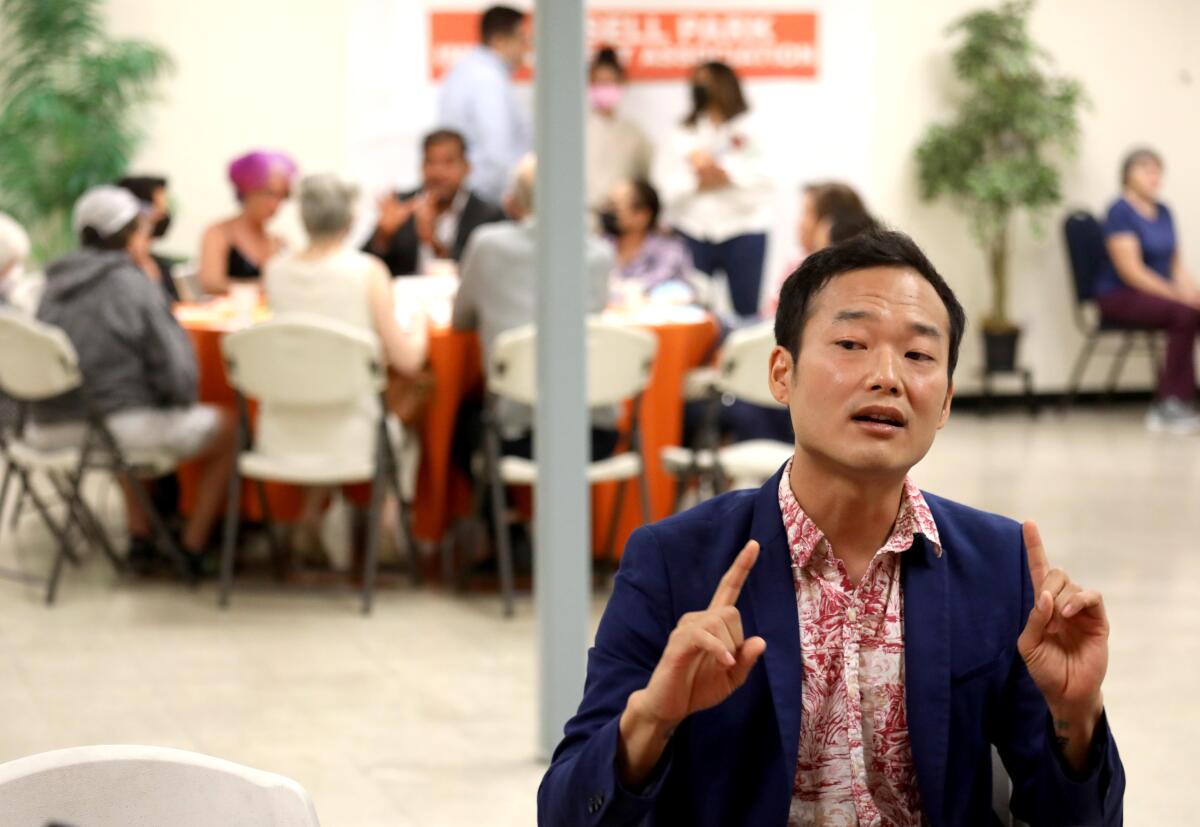
What the election — a rematch of the 2020 race that Gomez won by 6% — comes down to is a battle of what it means to be a progressive and what style of politics voters prefer.
Voters “are more to the left than the collective political establishment. It’s just a matter of having the right candidates, having the right mobilization,” said Fernando Guerra, a professor of political science at Loyola Marymount University.
Both Gomez and Kim advanced out of the state’s primary, in which the top two vote-getters regardless of party affiliation proceed to the general election. This year’s midterm in California features six congressional races between two Democrats.
To avoid being the first incumbent Democratic congress member to lose to a same-party challenger in Southern California in 10 years, Gomez, 47, must persuade enough voters that working inside the party is still effective. To pull off a win, his rival, Kim, 38, must sell enough voters across racial lines on “co-governing” with activists.
Last month, Kim was endorsed by Eunisses Hernandez, a community activist who has called for abolishing the police and who unseated Councilmember Gil Cedillo in June. Kim has put up billboards showing him with Hernandez.
Community activist Eunisses Hernandez unseated L.A. City Councilmember Gil Cedillo in June, but won’t take office until December.
“We are in a moment where we can either keep moving in the same direction with the status quo, or we can start making decisions and support people who represent a change,” Hernandez said as she looked at the new billboard near Occidental College in Eagle Rock.
The district, as political data expert Paul Mitchell calls it, is “where the different parts of L.A. politics come to meet.”
From high-rise apartments and nightclubs in Koreatown to small homes and taquerias in Boyle Heights, the 34th is a diverse, urban and gentrifying district that ranks among the poorest in the nation.
The district is majority Hispanic — once home to Edward R. Roybal and Xavier Becerra, two well-known Latino politicians — but has a sizable and influential Asian American and white population. About 80% of the district’s homes are valued at more than $500,000 and about 20% valued at more than $1 million.
Nearly 80% of the district’s residents are renters. Roughly 20% live in poverty.
“It has gone from a place where everyone can live here to a place where it’s very difficult for the people to get by,” said Donald Nollar, a 58-year-old Glassell Park resident who has lived in the area for 20 years.
Gomez and Kim both say they have endured hardships that help them relate to the struggles of the district’s residents.
A pastor’s child and a second-generation Korean American who was raised near Seattle and in the Bay Area, Kim graduated from the Benjamin N. Cardozo School of Law in New York during the Great Recession. When he couldn’t find good-paying legal work, he said, he juggled multiple jobs, including driving for Uber and Lyft until 4 a.m.
Gomez, who grew up in Southern California, said that when he was 7, his family nearly went bankrupt paying for medical care when he contracted pneumonia. They had no health insurance.
Gomez and Kim, however, prescribe different strategies.
Gomez said that as a labor organizer as well as a state Assembly member, he pushed for policies such as expanding paid family leave. He said he fought to extend the federal eviction moratorium in 2021 and he secured more than $11 million in federal funding for affordable housing in the district.
If reelected, Gomez said, he would advocate for a bill to create a tax credit to convert unused offices into housing and give renters money so they don’t pay more than 30% of their income for rent and utilities.
“If you look at Cori Bush, you look at [Alexandria Ocasio-Cortez], you look at Ayanna Pressley, Rashida Tlaib, Ilhan Omar, they all have something in common that I have,” Gomez said, referring to five progressive House members. “We have records.”
Kim argues that Gomez’s approach isn’t effective. Getting federal funding, he said, does not work if the city doesn’t use it well. He pointed out that Los Angeles had used only about 15% of its federal emergency housing vouchers to get people off the streets.
Kim’s platform includes banning no-fault evictions and “Homes Guarantee” — building 12 million publicly funded housing units over the next 10 years — and paying reparations for racist policies such as redlining. He has championed giving every adult $1,000 per month, a guaranteed income program embraced by people including former Stockton Mayor Michael Tubbs and former presidential candidate Andrew Yang.
If he sees a need for it, just like he did at City Hall a few weeks ago, Kim says, he is not afraid to get in people’s faces. He once protested in front of Gomez’s home, calling out the congressman for receiving money from special interest groups.
“I don’t think he understands the urgency,” Kim said of Gomez at a recent town hall in Glassell Park.
Here’s how to vote in the California midterm election, how to register, what to do if you didn’t get mail ballot or if you made a mistake on your ballot.
Ruben Vasquez, a 45-year-old city planner living in Glassell Park, voted for Kim in the primary. Vasquez said that he is frustrated with the city’s priorities, such as Los Angeles’ police budget, and that adding more funds “isn’t going to prevent a crime.”
“Jimmy is kind of like a good old boy network. He’s not going to sway the boat too much,” Vasquez said. “He’s still going to toe the company line.”
The L.A. Chapter of the Democratic Socialists of America is recommending a vote for Kim, as it did in 2020 when it said he is “a progressive much more in the 2020 mold.”
But Mark Gonzalez, a longtime resident and chair of the L.A. County Democratic Party, which has endorsed Gomez, calls Kim a “disruptor,” saying people like him are “not here to govern.”
“They are here to attack,” Gonzalez said. “I don’t think that there is a way for us to work together, and they’re not willing to work together.”
Nollar of Glassell Park, a patient advocate, said he sees some strength in Gomez’s history as an elected official.
“I see two good, honorable candidates, and the advantage of having a new person coming is new ideas,” said Nollar, who voted for Gomez in 2020 but is undecided this year. “But having someone who has been there means they know how things work.”
After Gomez finished a speech at an abortion rights rally in Mariachi Plaza on a Saturday morning — introduced by organizers as a “people’s congressman” — several residents rushed to greet him.
Paula, a 69-year-old retired social worker and an educator living in the district, was one of them. On a fixed income and renting, she’s grappling with the rising cost of housing and talks of seeing her friends and others living in overcrowded conditions — as many as 11 people in a single home.
Paula, who didn’t want her last name used because she was a witness in a recent criminal case and feared reprisal, recounted how Gomez and Assemblymember Miguel Santiago helped bring protective equipment such as masks to the community when the pandemic began. She said she sees Gomez as someone who champions affordable housing.
She also called him a role model for other Latinos. For her, building a coalition is important to address the area’s issues.
“He’s our voice out there, and I think that’s just so important,” Paula said.
The race may ultimately come down to Korean Americans.
In early absentee ballot returns in 2017, in an open-seat special election between Gomez and Korean American lawyer Robert Lee Ahn, Korean Americans made up nearly a quarter of votes, although they were only 6% of the district.
Ahn said his campaign visited every major Korean American churches in 2017, driving up the community’s turnout. Kim has also spoken at several big churches in the community, such as Young Nak Church of L.A.
Still, Mira Kim, a 52-year-old volunteer, said some churches had hesitated to invite David Kim, saying he faces prejudice because of his identity as a gay man.
“It’s heartbreaking that people judge him by one characteristic,” Mira Kim said. “But breaking that barrier is hard.”
At David Kim’s fundraiser in a Koreatown restaurant, Grace Eun Yung Oh, a 74-year-old community leader, had been troubled by Kim’s LGBTQ identity, but eventually came around, saying she ultimately understood it as “something God has created.”
Byungsun So, a 53-year-old chief executive of an educational company, has rented part of his office to Kim’s campaign and has rallied Korean Americans to support Kim. For So, Kim’s candidacy alone speaks volumes, he said.
“The Korean American community is traditionally conservative,” So said, “but if a progressive [Korean American] can win over the community, it’s a big change.”
Read more election coverage
California’s 2022 election ballot includes races for governor, attorney general, Legislature and Congress, local contests and statewide propositions.
More to Read
Get the L.A. Times Politics newsletter
Deeply reported insights into legislation, politics and policy from Sacramento, Washington and beyond. In your inbox three times per week.
You may occasionally receive promotional content from the Los Angeles Times.
